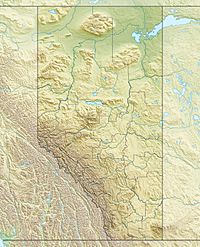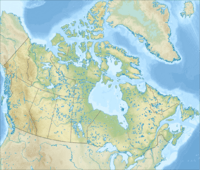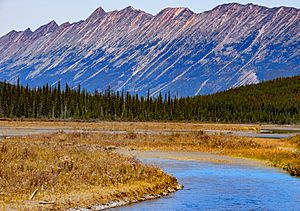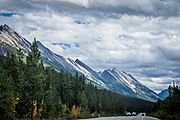Endless Chain Ridge facts for kids
Quick facts for kids Endless Chain Ridge |
|
|---|---|
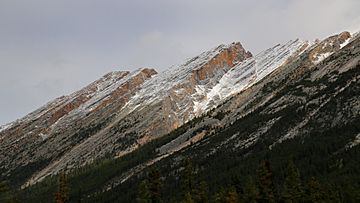
Endless Chain Ridge
|
|
| Highest point | |
| Elevation | 2,867 m (9,406 ft) |
| Geography | |
| Location | Jasper National Park Alberta, Canada |
| Parent range | Maligne Range Canadian Rockies |
| Topo map | NTS 83C/06 |
Endless Chain Ridge is a long mountain ridge. It is located in Jasper National Park in Alberta, Canada. This ridge is about 16 kilometres (10 miles) long. It stands 2,867 metres (9,406 feet) tall. The ridge is part of the Maligne Range in the Canadian Rockies. It sits near where the Sunwapta River meets the Athabasca River. From the Icefields Parkway, it looks quite ordinary. But from the east, it shows off as a rugged chain of peaks. These peaks are quite challenging to climb.
Contents
How Endless Chain Ridge Got Its Name
The name "Endless Chain Ridge" was given in 1907. This was the same year Jasper National Park was created. A woman named Mary Schäffer Warren named it. She was an explorer and writer.
Mary Schäffer wrote about her travels. In her book, she described the ridge. She said it was a "low, rocky ridge" that seemed to go on forever. She and her group followed it for a day and a half. When they reached the Athabasca River, it still stretched for miles. So, they called it "The Endless Chain."
The name was officially accepted in 1947. This was done by the Geographical Names Board of Canada.
Weather and Water Around the Ridge
Endless Chain Ridge has a subarctic climate. This means it has cold, snowy winters. The summers are usually mild. Temperatures can drop very low in winter. They can go below −20 °C (−4 °F). With wind, it can feel even colder.
Water from the ridge flows in two main directions. Some water drains west into the Sunwapta River. Other water flows east into the Maligne River. Both of these rivers eventually join the Athabasca River.
How the Ridge Was Formed
Endless Chain Ridge is made of sedimentary rock. This type of rock forms from layers of sand, mud, and shells. These layers were laid down over millions of years. This happened during the Precambrian and Jurassic periods.
Later, a big event called the Laramide orogeny happened. This was a time when the Earth's plates moved. This movement pushed the old rock layers up. They were pushed east and over younger rocks. This process created the mountains and ridges we see today.
More Pictures
 | James B. Knighten |
 | Azellia White |
 | Willa Brown |


